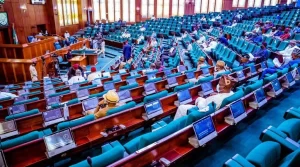Table of Contents
Lawmakers Plan to End Second Terms for Presidency and Governors, suggests 6 years for presidents and Governors


The citizenry is sharply divided over the six-year Single Term Presidency and Governorship Bill currently before the House of Representatives.

Join our Telegram Channel for Updates
The Bill, which proposes a single term of six years for the president and state governors, was introduced last Monday by 35 members of the House of Representatives. It also advocates for the rotation of the presidency among the six geopolitical zones of the country and includes provisions for a second vice president.
At the National Assembly Complex, the lawmakers, known as “The Reformers,” introduced the Bill among others on the House floor. Ikenga Ugochinyere (PDP, Imo), a member of the group, explained that the proposed changes aim to address regional agitations, reduce governance costs, and promote national unity.
If passed, this Bill would replace the current system of two four-year terms for public office holders with a single six-year term. The proposal has sparked debate, with some members of the House of Representatives choosing not to comment due to the sensitivity of the matter. One deputy chairman, who wished to remain anonymous, stated, “I am not a party to that Bill and whatever my position is will be said on the floor of the chamber.”
Public opinion is similarly divided. Some argue that the Bill would exacerbate corruption, while others believe it has several merits.
The Conference of United Political Parties (CUPP) contends that the primary issue is not the length of terms but the lack of purposeful leadership. High Chief Peter Ameh, CUPP spokesperson, said, “What we have now is good enough if we have purposeful leadership to drive it. Even if we return to regional government today what we will have is the decentralization of corruption.”
On the other hand, some, like Pa Dele Alake, see the Bill as a positive development. He argues that a single six-year term would set a more reliable foundation for the country and eliminate the deadwood among leaders. However, he expressed concerns about the initial implementation, questioning which geopolitical zone would start the rotation and how it would align with President Tinubu’s current term.
Dr. Abayomi Arabambi of the Labour Party supports the Bill, arguing that it would reduce the infighting for second terms, which often leads to corruption and unfinished projects. He believes the rotational arrangement would help address the marginalization of certain geopolitical zones and senatorial districts.
Conversely, Comrade Emmanuel Onwubiko of the Human Rights Writers Association of Nigeria (HURIWA) views the Bill as a misplaced priority, stressing that more pressing issues like insecurity and economic instability should be addressed first.
There are also differing opinions on the optimal length of a single term. Hon Stephen Adewale of the ADP suggests a five-year term might be more reasonable, drawing parallels to the tenure system in Nigerian universities.
Kennedy Peretei, Publicity Secretary of the Ondo State PDP, emphasizes that the core issue is not the term length but the need for diligent and accountable leadership. Professor Olugbenga Oke-Samuel from Adekunle Ajasin University advocates for creative, local solutions to Nigeria’s unique challenges.
Public sentiment varies, with some citizens, like Mrs. Titilola Ojulangbe, a trader, prioritizing good governance over term length, while others, like Mrs. Ajayi Modupe, a public servant, believe a six-year single term could check the excesses of leaders.
Legal practitioner Ayobami Oke sees the Bill as a means to ensure harmony among Nigeria’s diverse ethnic groups by rotating leadership roles. Otunba Tayo Onayemi, Convener of the Yoruba Commitment Forum, supports the Bill for its potential to curb over-ambition and political excesses.
However, the National Association of Nigerian Students (NANS) strongly opposes the Bill, calling it “anti-democracy” and an attempt to stifle accountability. NANS threatens to mobilize protests against the Bill, arguing that it would reduce leaders’ accountability and responsiveness to the electorate.
The Osun CDHR Chairman, Olowu Emmanuel, supports the single-term proposal, citing the negative impact of second-term ambitions on election integrity and poverty weaponization.
Lanre Ogunsuyi, former Osun State Commissioner, acknowledges the proposal but doubts its ability to address Nigeria’s political issues, emphasizing the need to examine the process of leadership selection.
The Igbo National Council (INC) warns that a single six-year term could lead to massive looting, advocating instead for the separation of election dates for different offices and the removal of immunity clauses.
Chief Emeka Diwe of the Association of Igbo Town Unions (ASITU) argues that the real issue is corruption and lack of integrity, not the term length. He calls for electing leaders with integrity to solve governance challenges.
The debate over the six-year Single Term Presidency and Governorship Bill continues, reflecting the complexity and diversity of opinions on how best to address Nigeria’s political and governance issues.









